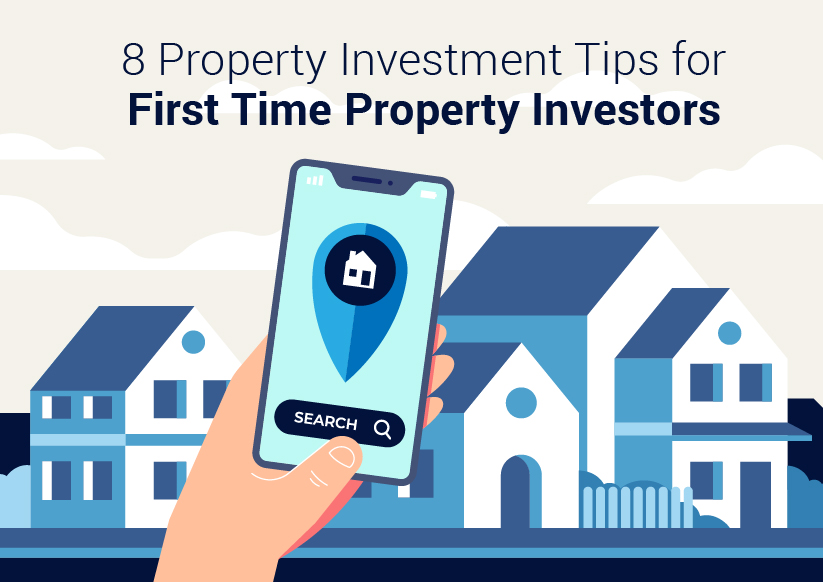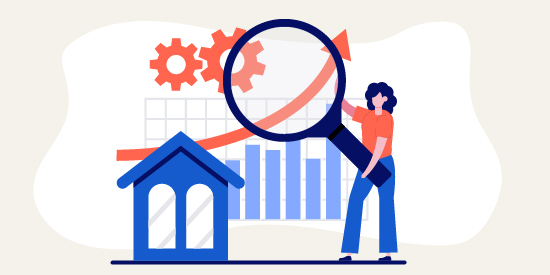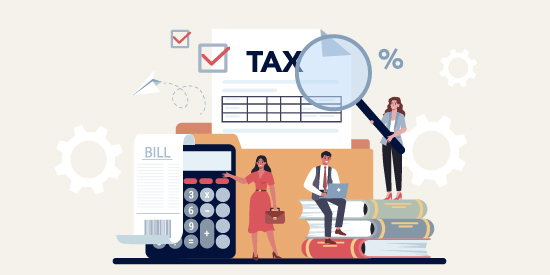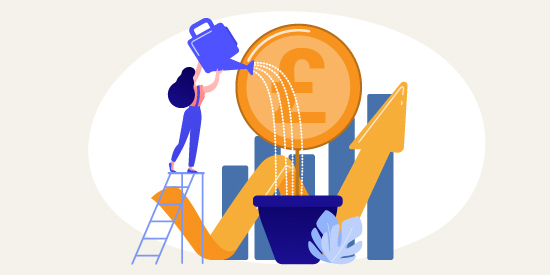8 Property Investment Tips for First Time Property Investors

While property investment can be a lucrative avenue to make your money work for you, there are many pitfalls that first-time investors can succumb to if they don’t do enough research and get to know the top property investment tips.
Those new to property investment need to carefully research the stages involved in property investment, get to know the UK property market and the best areas to invest in rental property. Luckily, we have a few guides to help you with that:
You also need to understand the implications of rental yields, capital gains as well as taxes and fees.
To make sure you get started on the right foot as a property investor, here are our top property investment tips.
Why Invest in Property?
Investing in property is one of the more lucrative – and low risk – ways to generate returns on your investment. Rather than letting money sit in a cash ISA with lower returns, or investing in stocks and shares which can come with higher risk, with an investment property you can usually watch the value increase over the years to gain a profit upon the sale.
Although, that doesn’t mean property investors don’t face any challenges. To be a successful investor you’ll need to gain a proper understanding of the property market and gain a set of skills that will see you through any and all ups and downs.
One of the key benefits of investing in property is that you can often use it to generate rental income as well. This means that you can make money from your investment even before you decide to sell. When investing in a buy-to-let property, you get the added benefit of seeing ongoing returns from monthly rental income that can be used to cover mortgage repayments and maintenance costs so that the property pays for itself.
If you want to know more about How to Make Money from Property Investment, we’ve linked that article here for you.

What are the Main Property Investment Strategies?
Before getting to the top property investment tips, the first thing to understand is that there are two main strategies when it comes to property investment. The first is acquiring a buy-to-let property. A buy-to-let property is one you purchase with the intention of renting it out to tenants, giving you a monthly rental income and ongoing returns over a long period.
If you’re new to this property investment strategy, here’s a Buy-to-Let Guide to get you started.
With a buy-to-sell property, an investor purchases a property to sell for an increased price. Also known as flipping, buy-to-sell usually involves adding improvements or refurbishing a property. This strategy can deliver a large one-off cash payment, as long as you make the right improvements to increase the property’s value and can find a buyer once you are ready to sell.
As inviting as property flipping may sound, it is not recommended for first-time property buyers. In order to actually make money on a buy-to-sell property, you need to be either a skilled renovator yourself or have contractors who would do the work for cheap. Otherwise, you’re more likely to overspend and lose money, rather than make any.
What are the Benefits and Drawbacks of Investing in Property?
As mentioned, the main benefits that come with property investment include:
- gaining attractive returns from rental income (if it’s a buy-to-let property)
- and capital gains with the property’s value appreciation once you are ready to sell.
However, something to bear in mind is that as with other investment avenues, such as investing in stocks and shares or cryptocurrency, there are no guarantees. A property could decrease in value depending on what happens with the property market. Therefore, it is important to research the local property market thoroughly and carefully consider your investment strategy.
Having a rental property also means that you need to find a steady stream of tenants to avoid vacant periods and loss of income, and renting to tenants comes with its own risks. It’s important that landlords conduct the proper background checks and undertake due diligence before letting any tenants rent the property to avoid late rental payments or unreliable tenants that stop paying rent altogether.
Finally, property investors need to be fully aware of their responsibilities as a landlord. Extra set-up costs may apply, including acquiring the right licencing and undertaking renovations to ensure any rental accommodation meets legal requirements. Also, it’s important to stay on top of maintenance and repairs to ensure the property is safe and habitable. Landlords are required by law to maintain the property in good condition, so you’ll need to budget for regular maintenance, repairs, and improvements.
To conclude, the drawbacks of property investment are:
- Property value can decrease
- Possibility of irregular tenancies
- Risky tenants
- Property investment can be management & time intensive
- Additional costs should be considered
Key considerations before buying an Investment Property
1. Invest in Property When it Makes Financial Sense
Before making any decision about a property you should thoroughly review your current and short-term financial situation, such as whether you have debts or large expenses coming up, and how large you want to keep a nest egg for a rainy day emergency. Be sure to consider ongoing payments and one-off costs to ensure that investing in property makes sense for you right now.
Once you have weighed up your finances, it is important to calculate the costs associated with the property and understand how much your investment could potentially yield.
2. Property Investment Tip: Understand Taxes and Fees when Investing in Property
As a property investor you need to be aware that the purchase price of the property is not the only thing you need to pay. Here’s an overview of the main taxes and fees you’ll need to consider, such as.
Stamp Duty
The stamp duty on a property in the UK comes with different thresholds and applies to anything over £40,000: 3% on anything up to £125,000; 5% on anything between £125,001 and £250,000; and 8% on anything between £250,001 and £925,000. The end of the stamp duty holiday in June 2021 means investors can no longer make significant savings on stamp duty property tax, and should budget accordingly.
Our friends from Galliard Homes in their article Stamp Duty for First-Time Buyers provide information on everything that may interest you on this topic.

Income Tax
For those investing in a rental property, income tax will apply to rental income. The percentage of tax you will be required to pay depends on how much rental income the property generates and will usually have to be paid at the end of the tax year.
Additionally, any costs associated with the rental property such as insurance and maintenance can be deducted from the total income when calculating the tax amount. It’s important to keep accurate records of all transactions related to the rental property, as this will help you calculate the correct amount of tax owed. Furthermore, it is also important to ensure that you are aware of any changes in tax laws or regulations that may affect your rental income or deductions.
Capital Gains Tax
Down the line, when it comes to selling your property, you’ll be liable to pay a tax on any profit generated from the property’s increase in value. Known as capital gains tax, the amount you will pay depends on the profit earned. When it comes to calculating the capital gains tax, you must take into account the cost of buying and selling the property, including legal fees and any other costs associated with the purchase.
It’s important to bear in mind that capital gains tax is only applicable on profits made from residential property sales; if you’re looking to make a profit from commercial property, you’ll be liable for corporation tax instead.
Before making any investment in property, be sure to understand the tax bands you fall into and get a solid idea of the financial responsibilities as a whole to make sure investing in a buy-to-sell or buy-to-let property is the right option for you.
3. Understand the Buy-to-Let Legal Requirements and Responsibilities
The next property investment tip is to ensure you are aware of the legal responsibilities that come with your property.
All landlords have basic responsibilities such as:
- ensuring the property is free from health hazards and that all gas and electrical equipment is safely installed, maintained and checked on a regular basis.
- Fire safety measures also apply and landlords must fit and test smoke alarms and carbon monoxide alarms and follow stringent fire safety regulations for property in a purpose-built block of flats or for houses and property adapted into flats.
Holding deposits are capped at one week’s rent and security deposits are capped to 5 weeks’ rent deposit for new and renewed tenancies (for rents under £50,000 per annum, or 6 weeks if the rent is £50,000 or more). There are also limitations on what landlords can charge tenants. For example, the interest on rent overdue by 14 days or more is capped at 3% above the Bank of England base rate.

Freehold vs Leasehold
Investors should take note of whether the property they are considering to purchase is freehold or leasehold.
With a leasehold property – usually a flat or apartment – the investor does not own the building or grounds which comes with less responsibility for damage costs or repairs. Leasehold is generally a good option for many investors because property ownership comes with less responsibility and damage repair costs should there be an issue.
For freehold properties, any damage or issues are the responsibility of the owner since they own the building itself and the land. As such, it is important for investors to consider their budget and the potential costs associated with owning a freehold property before making their decision.
To learn more on this topic, jump over to this article.
4. Property Investment Tip: Focus on Generating Returns on your Investment
When buying an investment property, the key for investors is to keep a focus on ROI rather than whether or not they like the property.
Now what does focusing on ROI mean in practice:
Aim for Robust Rental Yields
Be sure to assess the potential rental yield of a property. Strong rental yields mean that the property can pay for itself – covering any mortgage repayments, maintenance and upkeep and taxes and fees. Is there a market of ongoing tenants that will be interested in the property so you can avoid any vacant periods?
A good rental yield is anything around 5%. The higher the rental yield, the better the monthly cash income for the property investor, and rental yields of 8% or higher are highly desirable. The good news is that many areas of the UK offer relatively low property purchase prices and high rental yields of around 8%, so finding a good rental yield is a strong possibility.
It’s important to remember that rental yields can vary significantly depending on the area and the type of property you are looking at. As such, it is important to research the local market and the types of properties available before investing in a property for its rental yield potential.
Need some inspiration? We’ve compiled a list of the Cheapest Places to Buy a House in the UK.

Capital Appreciation
In addition to rental income, capital appreciation is another way to get a return on your investment as the value of the property grows, giving you capital gains when you come to sell it.
One of the best investment tips you can follow is to look for property investment for sale in an area where it has the potential to rise in value. Capital appreciation tends to be highest in cities that are undergoing regeneration, which attracts an influx of people, more tenants and results in the rising of property prices.
That said, you should also look for areas that have a strong economy and job market. Areas with high demand for properties will allow you to charge higher rents and will be more attractive to potential buyers when it comes time to sell.
It’s important to remember that capital appreciation is not guaranteed and should never be your only form of return on investment.
5. Investing in Property Advice: Target the Right Rental Demographic
Keep in mind that the rental demographic you target as a landlord can also impact the yields you can generate. A top property investment tip is to consider that certain rental demographics may generate more income than others.
Typically, students pay higher rent than other tenants and yields for a student property of a good standard in the right location can generate yields of up to 20% higher than renting to a single family. International students and post-graduate students are also willing to pay more for accommodation and attracting these tenants can be lucrative, especially if high-quality accommodation is in short supply in the area. Here’s some more information to help you decide if a student property is a good investment for you.
Investors may also consider purchasing a property as a holiday let. If a property is in a popular area, renting out to holidaymakers on a short term basis can be lucrative as weekly or monthly rents will go for a premium. Investors should be sure that the property is in a popular location that gets constant demand and consider that in the low or off-season demand may drop or the property may be vacant.
6. Stay up-to-date with Property Trends
Before investing in any type of property, make sure you are well aware of property trends and projected changes to make sure you select the right investment.
For example, with the Coronavirus pandemic, the market saw a slight shift in demand. Property buyers are prioritising larger properties with outdoor space and, in particular, extra rooms for an office due to an increase in working from home. Similarly, with more companies open to remote working arrangements, many tenants and homeowners are looking to the suburbs where they can have more space. Be sure to remain aware of regional and national trends in the property market to ensure you are investing in what people want.
But that’s all old news, right? To see what the property market has in store for 2023, check out our Housing Market Predictions.
7. Buying Properties? Start Small
For first-time investors starting their journey, some of the best property investment advice is to start small.
In certain areas of the UK, a £50k budget is sufficient to secure an affordable and profitable investment property for sale, and is a good amount to test the water to see if investing in property is for you.
Focus solely on properties that fit within your budget, those that have the potential to generate returns and remember that you will need at least 25% of the property price as a deposit.
If one of your goals is to own a property portfolio down the line, investing steadily in one or two properties initially can help you to become more knowledgeable and confident. Need more guidance on this topic, take a look at this guide: How to Build a Property Portfolio
If you are looking to invest in multiple properties, working with a property investment company can help you to find opportunities suited to your goals as your portfolio grows and give you sound investment strategy advice.
8. Have an Exit Strategy
Before buying properties, be sure to consider your exit strategy – have a plan in place to ensure you can get the most profit when it comes to selling your property. Investors should always be looking into property market trends so they can make a sound decision on when to sell the property for the highest price.
Right now the UK market is robust, and certain areas are set to see rapid growth through to 2025, so read on to see the best places to invest in property as a first-time property investor.

Property Investment Tip: UK Cities First-Time Investors Might Want to Consider
Many markets across the UK are presenting investors with opportunities to secure decent rental yields and present strong potential for capital gains in the coming years. First-time investors may want to pay attention to the following areas of the UK:
Liverpool
Liverpool takes the crown for the highest rental yields in the UK. The L1 postcode can reach as high as 10% and other Liverpool postcodes can make worthwhile investment locations with yields between 5-7%. As well as home to a large student population, which can present lucrative opportunities for landlords to make a profit, decent properties can be had with a £50k budget with strong potential for capital gains as the city undergoes an exciting period of regeneration. Read more about the reasons to invest in property in Liverpool.
Manchester
Alongside Birmingham, Manchester topped the chart as the UK city landlords were most likely to invest in in 2021. Undergoing significant regeneration and already a city of culture and employment opportunities, Manchester is set to see both the highest sales price and rental growth of any UK city – the average value of property in Manchester through 2024 is set to grow by 17.1%. It’s also home to a thriving student population, which supports a healthy rental market with demand for student accommodation currently outstripping supply. Read more about reasons to invest in property in Manchester.
Leeds
One of the UK’s most exciting rental markets, the average house price in Leeds currently stands at £267,740. Additionally, house prices and rents will grow 19.9% and 18.8%, respectively. This will place the city second only to Manchester in terms of house price growth expectations. Leeds presents landlords with attractive yields, too, with average yields sitting at around 4.29 %.
Here are 10 reasons to consider an investment property in Leeds.
Bradford
Away from the bigger cities, Bradford is a hidden gem offering growth potential, relatively cheap property, high tenant demand and strong yields. Bradford was named in the top 10 best buy-to-let areas in the UK, and some properties in the BD1 area can offer between 8 – 10% rental yields. Read more about why Bradford can make a good property investment destination.
Investing in property can be a lucrative avenue and this list of property investment tips can help you on your way to purchasing your first investment property in the UK. Just remember to ensure you fully understand your responsibilities, get to know the market, potential yields and scope for capital growth on the property, as well as staying up to date on property trends. To talk to our experts and gain strategic advice on making a property investment, get in touch today.

